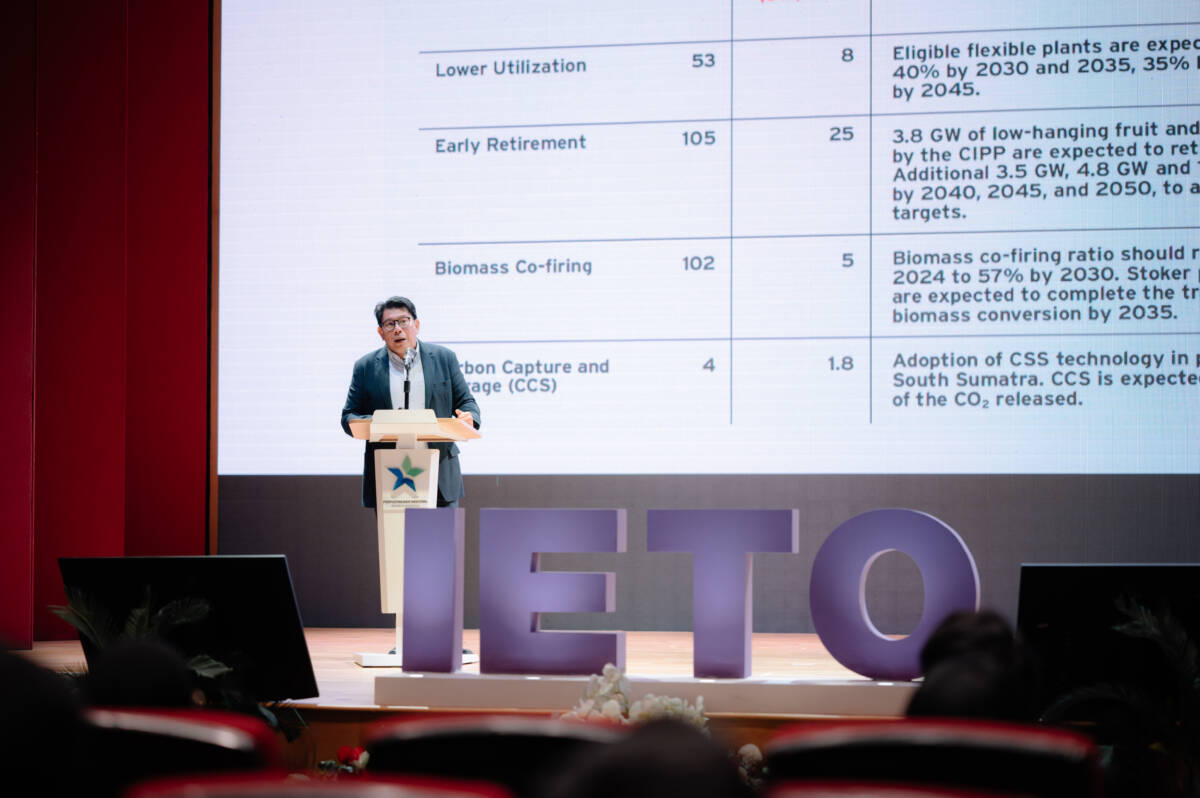Jakarta, February 2, 2025 – The President’s Special Envoy for Climate and Energy, Hashim S. Djojohadikusumo, stated at the ESG Sustainability Forum 2025 that the Just Energy Transition Partnership (JETP), agreed upon in November 2022, is a failure due to the lack of disbursed funds. He linked this to the United States’ withdrawal from the Paris Agreement following Donald Trump’s re-election. He also claimed that President Prabowo never planned to retire coal-fired power plants by 2040, arguing that such a move would be “economic suicide.”
The Institute for Essential Services Reform (IESR) considers Hashim’s statement regarding JETP’s failure inaccurate and misleading, as it is not based on data. The JETP agreement, endorsed by the Government of Indonesia and the International Partners Group (IPG), aims to accelerate the energy transition in the electricity sector, increase the share of renewable energy in the power grid, and cap emissions at 290 million tons of CO₂ by 2030. To meet these targets, a USD 20 billion funding commitment has been secured, with USD 10 billion from IPG and USD 10 billion from the Glasgow Financial Alliance for Net-Zero (GFANZ), comprising various banks and financial institutions.
JETP funding is not provided as direct cash assistance but through various mechanisms, including grants, technical assistance (TA), equity investments, bilateral and multilateral financing, and commercial project funding.
As of December 2024, according to IESR, funder countries within IPG have disbursed USD 230 million in grants and technical assistance for 44 programs, with an additional USD 97 million for 11 programs still pending approval. Additionally, USD 1 billion has been allocated for equity investments and loans for eight approved projects, including USD 126 million from the International Development Finance Corporation (DFC) to finance the Ijen geothermal power plant project. A further USD 5.2–6.1 billion is allocated for 19 projects still under approval, while USD 2 billion is provided as project guarantees from the UK and US governments. These guarantees are crucial for reducing project risks and loan interest rates.
In 2023, the JETP released its Comprehensive Investment Policy Plan (CIPP), outlining the funding needs for renewable energy generation, grid infrastructure, energy storage, and just transition initiatives, with an estimated USD 97 billion required until 2030. Many projects listed in the CIPP include existing projects from PLN’s 2021–2030 RUPTL, alongside new projects to accelerate Indonesia’s renewable energy mix.
Fabby Tumiwa, Executive Director of IESR, urged the Indonesian government to reinforce its commitment to the energy transition, aiming for net-zero emissions by 2060 or earlier. He stressed that Indonesia should not be discouraged by Trump’s decision to withdraw from the Paris Agreement or the implications of the “America First” energy policy on JETP. He explained that the initiative does not solely rely on the US government. The IPG consists of multiple countries and international financial institutions that remain committed to funding Indonesia’s energy transition.
Fabby emphasized that the government must strengthen its commitment to implementing JETP under President Prabowo through several key actions: First, continue the National Energy Transition Task Force (TEN), previously led by the Coordinating Minister for Maritime Affairs and Investment, and align it with the new cabinet structure to coordinate JETP, the Energy Transition Mechanism (ETM), and other initiatives.
Second, accelerate policy reforms to eliminate barriers to renewable energy development, as identified in the CIPP. Third, align JETP targets, including a minimum 34% renewable energy mix by 2030 and a peak emission cap of 290 million tons of CO₂ by 2030, with national energy planning documents such as the National Energy Policy (KEN), the National Electricity Master Plan (RUKN), and the Electricity Supply Business Plan (RUPTL). Fourth, expedite the approval of the early retirement of PLTU Cirebon I under the ETM scheme, a process that has been ongoing for three years.
“Energy transition is essential for achieving sustainable economic growth, as outlined in Indonesia’s National Long-Term Development Plan (RPJPN) 2025–2045. It is also one of the 13 Super Priority Transformations the government must implement. On the other hand, President Prabowo aims for 8% economic growth, which requires a significant increase in renewable energy availability and investment in renewable energy infrastructure,” Fabby stated.
He noted that continuing reliance on fossil fuels and coal-fired power plants poses economic risks, including missed opportunities to cut emissions and lower energy costs, increased subsidy burdens, and failure to scale up renewable energy projects. Delaying large-scale renewable energy development would weaken Indonesia’s competitiveness in Southeast Asia and discourage foreign investment in manufacturing, digital, and advanced industries, which are crucial for Indonesia’s future economic growth.
IESR supports President Prabowo’s pledge at the APEC and G20 Summits to phase out coal-fired power plants by 2040 and achieve 100% renewable energy by 2050. An IESR study, “Financing Indonesia’s Coal Phase-Out: A Just and Accelerated Retirement Pathway to Net-Zero,” highlights the economic benefits of early coal retirement.
By shutting down coal-fired power plants, Indonesia could save USD 34.8 billion in electricity subsidies and USD 61.3 billion in health-related costs from air pollution, two to four times greater than potential losses from stranded assets, decommissioning costs, job transitions, and reduced coal-related state revenue.
To ensure progress, IESR urges President Prabowo to direct his ministers to translate JETP commitments into concrete national electricity plans.

